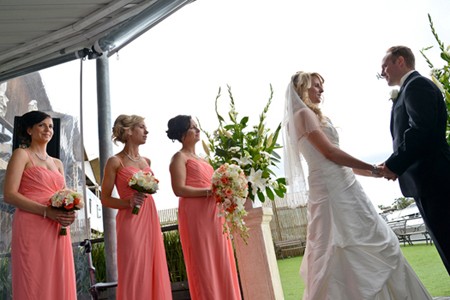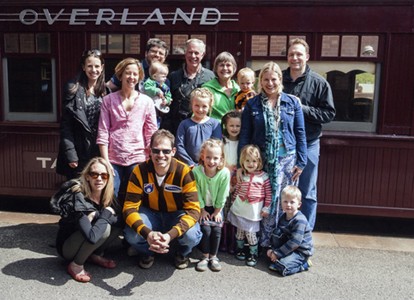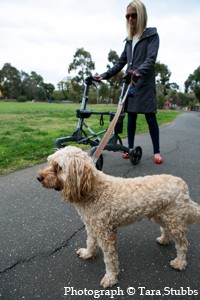Reinventing Emma (23 page)
Authors: Emma Gee

“I can't do stairs with a walking frame,” I whimper.
“Ohhhh sorry, Ma'am, but we have no other rooms tonight,” she says.
So I peer up the big staircase. “I will crawl up these stairs, but if there's a fire come and get me.”
Sheepishly, she leaves.
I leave my frame at the base of the stairs and take a deep, shuddering breath. I then hitch up my grey suit skirt, tuck my PJs under my arm, hold my toilet bag in my teeth and crawl.

Six months and many emails later, I was reimbursed for both my excess-baggage payment and my night in the âsemi-accessible room'. Hopefully my persistent attempts have helped educate service providers, heightened social inclusion and shown others what is possible.
Chapter 37
The Longevity of Stroke
As a naive stroke survivor I thought that over time things would slowly become easier and get better. But I have learnt that stroke is a never-ending story, particularly where my vision is concerned. Over the years my ophthalmologist has suggested ways to preserve my sight and slow the deterioration in my right eye. Despite religiously following her instructions to lubricate, cling-wrap, use an eye patch, etc. my vision has slowly worsened. Since my stroke my right eye has been drying out and slowly dying.
The end point in the race to save my eye is a tarsorrhaphy, but I have done everything in my power to avoid this. It is an old-school procedure where they stitch your eyelid partially closed, thus permanently shutting the eye and protecting it from further infection. After years of measures to normalise my image, the prospect of sewing my eye shut feels like giving up. Despite the difficulty of going against many experts' recommendations, I have decided not to go through with this procedure. I need to look at the situation holistically. The procedure would impact more areas in my life than my vision. My confidence, my youth, my image, would also be further compromised. Not having the surgery was the right decision for me.
I take full responsibility for how my eyesight is today. Having this ownership prevents me from blaming or living in the past and I find that complaining about the symptoms (that could've been prevented or delayed if I'd opted to have the procedure) isn't fair on those around me, and a waste of energy.
It is what it is.
I have opted to continue lubricating my eye, moistening the environment I'm in and even resorting to wearing my dreaded eye patch again at home.
Regardless of all that, I'm now basically blind in that eye. Over the years I've adjusted to focusing on the spinning vision I have in my left eye. I've sought advice about bionic eyes, nerve grafts and other options. Ophthalmology research is moving so fast. I remain optimistic that one day it will catch up with me.
My eyes are one of many ongoing health issues. I now take preventative measures like having annual flu vaccinations and continue with Botox injections. Another unexpected problem secondary to my stroke is the need to wear a plastic mouth guard at night. After a childhood wearing expensive braces, my atrophied jaw muscles are causing my perfectly aligned teeth to shift.
The financial toll is immense. Instead of saving for holidays or my kids' school fees, I'm paying for medical aids and procedures. What's more, I am not able to work as I once did. It's physically and emotionally taxing, but I have to factor in room to incorporate my ongoing stroke recovery needs. I am fortunate and reassured to know that my parents are always there for financial support should I need them. The stress that this lifts from my life is huge. Especially when Centrelink constantly suspends my pension, assuming I'm no longer disabled. I am forever grateful for the financial security so many others don't have.
Equipment is essential and I admit I choose to get aids that are not just functional but also younger looking and funkier. They're more expensive but they make having to use an aid at my age more bearable. It's easier to accept if it's one that's well designed and fashionable. Yes, even in the disabled world there is a fashion hierarchy! Unfortunately frames need replacing, which means forking out $700 to $800 every couple of years. My first frame was snapped in half like a chicken bone by an overly helpful stranger handling it. Mum drove over the second one with her four-wheel drive. The third frame rusted and the fourth one was
stolen
from my carport.
The longevity of stroke continues to test and challenge me. At times I feel the after effects of stroke just keep punishing me. Even eight years later, I needed more head surgery. The metal screw from the plate used in my craniotomy had rubbed on the arm of my glasses and become infected, needing to be removed. I was unable to wear glasses for months while it healed. I thought another operation and the associated dependence would hugely set me back. But maintaining important things in my life makes each difficulty much easier to withstand. Being a bridesmaid for one of my best friends, despite my having âa screw loose', was both an honour and a great distraction.

Bridesmaids Kim, Em & Mel celebrate Tracey and James' wedding, Melbourne 2013.
While I've endured many physical obstacles so far, the emotional toll is often overlooked. Depression is the Siamese twin of stroke. Your mood fluctuates like a seesaw: high when something finally clicks after years of practice, low when you feel like you've gone backwards or need to ask for help.
None of the obstacles I've faced could have been dealt with without the incredible support network I'm lucky enough to have. Despite my stroke drastically changing the dynamics of our family, the way they all have supported me throughout my journey has been unbelievable. Mum and Dad are my all. Despite the distance, they frequently visit and are constantly there for me. They are not only my best supporters but also my best friends. And my siblings â they've never complained to me about me stealing my parents' attention from them, even though I still lie awake at night feeling guilty about it.

Em with her siblings, 2014. (L-R Pete, Em, Bec & Kate)
Bec has been a constant motivator in my life and I know will always be there for me. As my identical twin and with her âanything's possible' mindset, she has provided me with a baseline. She has always challenged me. If I'm too sensitive, she tells me so, always reminding me to move forward and not to take things too seriously. I sometimes become jealous of her living the life I had planned, getting married and having three beautiful kids. But her new little family make me feel included in their life. In a way, her having a baby was the closest thing to me having my own children. Even today, three babies later, when she says, “Em, she's got our eyes,” I feel a shiver of excitement and burst into a smile.
Now that Bec has a young family I seem to be the one with all the freedom. “Do yoga for me, Em,” she'll say with a sigh, removing the pink lid of the play-dough with her teeth, stirring the pot of soup she's cooking on the stove while balancing her youngest on her hip. I leave the chaos, feeling guilty at having ample âme time', off to yoga and a peaceful hot coffee to follow.
My brother Pete is very different to Bec. Over the years I have really come to rely on his opinions. He's very sensible, full of wisdom, and he rarely makes a quick decision; he examines the pros and cons of every situation. My sister-in-law Rach is unbelievably supportive and nurturing, while also very practical and straightforward. Over a cup of tea I often discuss an issue that is bothering me in my life, and Pete and Rach always give me their direct, very rational viewpoint. They have the ability to step aside and assess a situation and not get emotionally bogged down. I'm sure without their foresight, wisdom and guidance I would have made some bad decisions.
Although my older sister Kate lives interstate and is busy with her work and family, she has been a constant listener and enables me to live in the present. As OTs we have a lot in common. Although due to work commitments nowadays my stays there are less frequent, I still always feel so welcome in their home, their spare room even entitled Em's Room. My niece pointed out that they couldn't buy a certain house as there were, “Too many stairs for Emma.”
At times when I have become too engulfed in an issue my many supporters have helped me to highlight the positives and put things in perspective. I recall Bec's words when I was contemplating whether or not to stitch my eye closed and struggling to find any optimism in the situation. “Look at the positives, Em ⦠you'll have the blokes in the street lining up, thinking that you're winking at them,” she said. Her attitude is contagious and reminds me that a sense of humour is essential.

Em with her incredible family, Castlemaine 2014. Back row (L-R) Bec, Paul, Tom, David, Lyn, Harry, Doug. Middle row (L-R) Rach (in pink), Lucy, Holly, Kate. Front row (L-R) Em, Pete, Ellen, Olive, Jack.
Chapter 38
Life Now
Pain screams around my left side and rams into my throbbing joints, but I don't give my sleep-deprived body a chance to entertain the thought of staying in bed. After quickly meditating to get my mind in a positive state I throw my covers off and let the cold air continue to wake me. I dress my body before it realises we're going for an early swim. It's raining, but I know that moving my body is the only way to manage my pain and refuel my daily motivation. It's now my sole medication.

Em meditating. She now incorporates time in her day to stop and reflect, 2015.
The lifeguard sees me and disappears into the pool storeroom to retrieve my flippers, running belt and neck float. Keeping them here saves me lugging them to and from the pool in a cab. He fights the rain and carries them to the pool's edge. “Looks like you're the only one braving this weather. Enjoy your swim, Em,” he says with a smile. I leave my frame locked on the pool's edge and, after dangling my numb toes in the water, force myself to jump in.

Running is now replaced by swimming. I've grown to love it, enjoying the freedom of leaving my frame on land. I swim in a full-length wetsuit all year round, in rain or sunshine, to compensate for my warped body thermostat. I chuckle at fellow swimmers' puzzled looks when I enter the water in a âwetty' on a 30-degree day. With experience the obstacles I'd faced in relearning to swim have now sunk out of sight and mind. They still exist but I can now float above them.

Emma relearns how to swim, floating above her pain, 2010.
Swimming is my pain medication, and my anti-depressant. After years attempting to completely cure and rid myself of my nerve pain, I have finally accepted its presence. Rather than let its undeviating existence control me, I've become an observer of it. By acknowledging it, I've learnt to make room for it and try to distance it from my daily life. After religiously jotting down daily pain patterns for months in a diary, I have become aware of what triggers and exacerbates my pain. If I have niggling pain or am feeling flat or sluggish, I enter the water and imagine the negativity leaving my body like osmosis. Likewise, if my pain worsens I visualise kicking it out. I emerge from the pool feeling refreshed, refuelled and ready to tackle my day.

Once home, I hang my wetsuit up to dry, whack some more eye gel into my right eye and crawl to gather my laptop to do some work at the local café. Although my swim has dulled my nerve pain, a combo of the weather and tiredness still means it niggles.
Give me a break, body!
I plead. At least I have kick-started my motivation. A coffee will hopefully help and getting out will be a good distraction. I open my heavy front door by wedging my left elbow in the gap then squeeze through the opening and simultaneously grip and guide my frame. I shuffle to my scooter, Harley, my car substitute. He's very familiar with the route to my local coffee shop. I know the bumps in the footpath to dodge to make the trip faster. Eager for coffee, I switch the vehicle onto high speed (still turtle-slow) and glide down the hill.
Feeling so free. Moving forward and fast
. After years of trying to adapt to my life, I am beginning to feel more in control of things.
I park on the nature strip. A waiter sees me approach and comes out to help me.
“Hi Em, how's things today?” He carries my heavy red laptop bag inside and holds the door open for me. He places my bag on the brown booth seat. I trail behind him and sit beside it.
“Same coffee as usual, Em?” he asks, pouring me water and slipping in a straw.
I open my laptop to begin planning my next presentation. Crazy, but I love working in a noisy, chaotic environment. Despite having a home office, getting out among the background hum of people is easy, undemanding company. It's a routine I have incorporated into my day.
Nowadays, I typically café hop, writing and taking regular breaks for yoga, swimming or seeing friends. I spend the remainder of my day preparing for upcoming presentations, developing new content, meeting clients or fellow patients, doing voluntary work and research.

Emma in her typical workplace, preparing for an upcoming presentation, 2015.
My iPhone beeps, signalling that I have a text. âCongrats on doing that walk, Em.” I smile and force myself to soak up the praise. To sustain motivation and remember to keep challenging myself is tough, especially when often I don't see a huge change in my performance. Many of my achievements are hard to celebrate. They were once so easy and are seen as a cinch to many around me. When you're continually trying to keep up with others it's hard to allow yourself time to
stop
and evaluate your achievements. Quite often I respond to others' congratulations sarcastically, failing to acknowledge the milestone. Instead I just keep going, striving for the next thing on my bucket list.
I admit to feeling a bit hard done by when an accomplished task is not recognised. I know that I have to announce this achievement, even though it seems like I'm bragging. As time has passed, and people's priorities have become so different to mine, it's even harder to get their attention. My achievements can easily float by unacknowledged.

Emma's companion, Gilbert 2014.
After a few hours of work, I return home and loop Gilbert's red lead over my frame's handle and take him to the park to meet my niece and nephew for sushi. I adore all my nieces and nephews and I am forever grateful for the huge role I have in all their lives. While it scares me that there's less âAuntie Em' time as the families all expand and age, I try to be the best auntie I can be. I can relate to their cries of frustration as they learn to speak or walk for the first time. But their staggering, rigid first steps are only temporary. As they've developed and mastered these milestones, I've secretly thought they'd run away and leave me behind when they could. But they surprise me every day with their understanding.
“Let's play
What's the time Mr Wolf
,” my niece says. She jumps up and down on the spot, releasing any extra excitement by shaking her hands. In a high-pitched, breathless manner she tells her brother and me the instructions. “So what you do is when I yell, âDinner time!' you both run away from me so ⦔
She abruptly stops. She stands still. Scratches her head, frowns seemingly confused, looking back and forth from my frame to me.
She's realised that I can't run. How do I explain this?
Then suddenly she widens her eyes and says, “Oh umm. Auntie Emma you try to run, OK? Just hold onto your bike [aka frame] and pretend?” I'm chuffed at her problem-solving ability to include me. In fact, my frame is a novelty and they take turns to sit on it. Even when we cross the road, they hold onto the frame's handle as if it were my hand.

Over time, along with the trust and support of my siblings I've adapted how I do things. Changing nappies on the ground, wheeling my non-walking nephew in a block trolley to move him safely, transferring hot Milos from the microwave to the island bench on my walking frame's seat or taking my nieces on special outings to the movies via cabs. I proudly attend their kinder concerts or swimming classes and am silently thrilled that I'm always invited. In my mind, I am the luckiest auntie in the world.